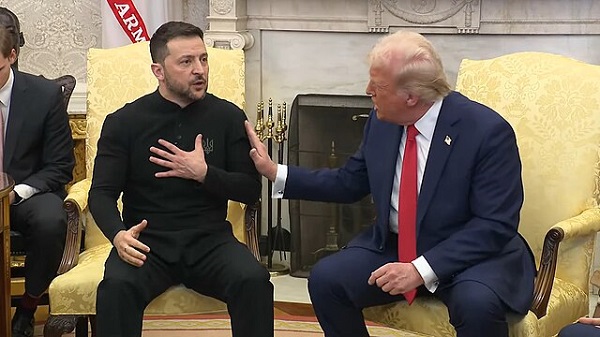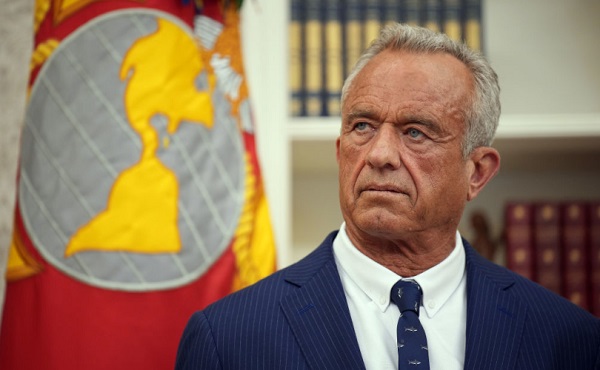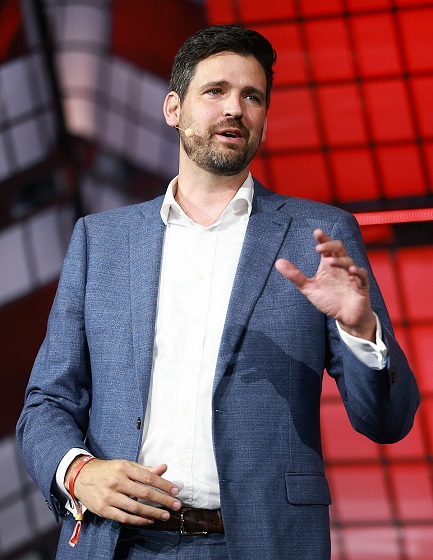International
Zelensky, not Trump, instigated Oval office clash

 MxM News
MxM News
Quick Hit:
Miranda Devine pushes back against claims that 47th President Donald Trump “ambushed” Ukrainian President Volodymyr Zelensky during their Oval Office meeting, arguing that it was Zelensky who provoked the confrontation. Devine contends that Trump was “cordial” and intent on brokering peace, while Zelensky entered the meeting “in bad faith,” contradicting and interrupting the president before ultimately derailing the negotiations.
Key Details:
-
Devine asserts that Zelensky was “negative from the start,” contradicting Trump within minutes and repeatedly interrupting him in an “insolent” manner.
-
Treasury Secretary Scott Bessent said Zelensky should have voiced concerns privately at a scheduled lunch instead of creating a public spectacle.
-
Trump’s detractors, according to Devine, are using this incident to fuel yet another “Russia hoax” in their ongoing attempts to discredit him.
Diving Deeper:
Miranda Devine, in her latest op-ed for the New York Post, refutes the mainstream media’s portrayal of 47th President Donald Trump’s recent Oval Office meeting with Ukrainian President Volodymyr Zelensky as an “ambush.” Instead, she argues, it was Zelensky who instigated the confrontation by entering the meeting with “negative body language” and a “hostile attitude.”
“Trump could not have been more cordial,” Devine writes, emphasizing that Trump had successfully navigated complex negotiations to bring both Russia and Ukraine to a moment where peace seemed possible. But Zelensky, she asserts, was determined to sabotage that effort.
From the outset, Zelensky took a defiant tone, directly contradicting Trump’s assertion that Europe had provided far less financial support to Ukraine than the U.S. “President Trump said that they made less support, but they are our friends,” Zelensky interjected, attempting to downplay Trump’s concerns. When Trump reiterated his position, Zelensky repeatedly interrupted with “No, no, no.” Despite Trump’s attempt to keep the exchange lighthearted, the tension in the room was palpable.
Treasury Secretary Scott Bessent later weighed in on the debacle, telling Fox News that “if Zelensky wanted to contradict Trump, the proper venue for that would have been 15 minutes later [at a private lunch].” Instead, Zelensky chose to grandstand before the press, leading to what Devine describes as the complete “blowing up” of the peace talks.
At the end of the meeting, Zelensky’s smirk and thumbs-up to someone off-camera left little doubt in Devine’s mind that he had orchestrated the confrontation deliberately. His ambassador, she noted, appeared distraught, watching the spectacle unfold “with her head in her hands.”
Devine sees a broader political game at play. She argues that the media and Trump’s political enemies have seized upon this incident to spin yet another “Russia hoax,” akin to the discredited Steele dossier, the first Trump impeachment over a call with Zelensky, and the “Laptop from Hell” censorship saga. “They could not tolerate that Trump… would be successful in ending the war,” Devine writes, suggesting that warmongers on both sides of the aisle needed this peace effort to fail.
Trump, for his part, did not let the moment pass without drawing a direct line to the Biden family’s corruption in Ukraine. He referenced Hunter Biden’s infamous laptop, telling Zelensky: “It came out of Hunter Biden‘s bathroom. It came out of Hunter Biden’s bedroom. It was disgusting. And then they said… the ‘laptop from hell’ was made by Russia. The 51 agents. The whole thing was a scam.”
Despite his provocations, Zelensky was met with Trump’s signature diplomatic coolness. When Zelensky dismissed the minerals deal, a key component of Trump’s proposed peace framework, Trump did not lash out. Even when Zelensky warned that “your American soldiers will fight” if Ukraine failed, a “severe provocation” as Devine puts it, Trump remained composed.
Only after an extended barrage of Zelensky’s interruptions and dismissive tone did Vice President JD Vance finally respond, stressing that “the path to peace and the path to prosperity is maybe engaging in diplomacy.” That set Zelensky off, leading Trump to finally push back. “We’re trying to solve a problem,” he told the Ukrainian leader. “Don’t tell us what we’re going to feel, because you’re in no position to dictate that.”
Now, with the negotiations shattered, the fate of Ukraine rests in Europe’s hands at an upcoming summit. “Ukraine can’t survive without America,” Devine warns, and Zelensky may soon realize that the stunt he pulled in the Oval Office cost him far more than he anticipated.
You can watch all 46 minutes of the February 28 meeting between Trump, Vance and Zelensky here.
Health
RFK Jr. urges global health authorities to remove mercury from all vaccines

From LifeSiteNews
Health and Human Services (HHS) Secretary Robert F. Kennedy Jr. is urging health leaders across the planet to stop including mercury in vaccinations.
“Now that America has removed mercury from all vaccines, I call on every global health authority to do the same — to ensure that no child, anywhere in the world, is ever exposed to this deadly neurotoxin again,” he said.
Kennedy’s comments came in a video he recorded for the Minamata Convention on Mercury. The event is an international gathering aimed at preventing human contact with mercury, which, according to the World Health Organization (WHO), is one of the top 10 chemicals of major public health concern. The treaty, backed by the United Nations (UN), was first signed in 2013 by over 140 countries.
Kennedy noted that while the group’s goal is no doubt praiseworthy, it has not gone far enough in its efforts.
“Article 4 of the convention calls on parties to cut mercury use by phasing out listed, mercury-added products. But in 2010, as the treaty took shape, negotiators made a major exception. Thimerosal-containing vaccines were carved out of the regulation,” he recalled.
“The same treaty that began to phase out mercury in lamps and cosmetics chose to leave it in products injected into babies, pregnant women, and the most vulnerable among us,” he noted. “We have to ask: Why? Why do we hold a double standard for mercury? Why call it dangerous in batteries, in over-the-counter medications, and make-up but acceptable in vaccines and dental fillings?”
This past summer, Kennedy’s Advisory Committee for Immunization Practices launched a study to research the vaccine schedule for children. Among other recommendations, the committee advised the removal of thimerosal, a neurotoxic, mercury-containing preservative that had been used in flu shots.
Kennedy noted in his video message that “thimerosal’s own label requires it to be treated as a hazardous material and warns against ingestion,” adding that “there is not a single study that proves it’s safe. That’s why in July of this year the United States closed the final chapter on the use of thimerosal as a vaccine preservative, something that should have happened years ago.”
Kennedy further explained that thimerosal is “a potent neurotoxin, a mutagen, a carcinogen, and an endocrine disrupter” while noting that “safe alternatives” already exist.
“Manufacturers have confirmed that they can produce mercury-free, single dose vaccines without interrupting supply. There is no excuse for inaction or holding stubbornly to the status quo,” he exclaimed. “Now that America has removed mercury from all vaccines, I call on every global health authority and every party to this convention to do the same.”
“Let’s honor and protect humanity, and our children, and creation from mercury,” he concluded.
The Minamata Convention on Mercury went into effect in August 2017. It was initially approved by the Intergovernmental Negotiating Committee in Geneva, Switzerland, in January 2013. It was adopted in October 2013 at a Diplomatic Conference in Kumamoto, Japan. Per its website, it is named “after the bay in Japan where, in the mid-20th century, mercury-tainted industrial wastewater poisoned thousands of people, leading to severe health damage that became known as the ‘Minamata disease.’”
Censorship Industrial Complex
School Cannot Force Students To Use Preferred Pronouns, US Federal Court Rules


From the Daily Caller News Foundation
“Our system forbids public schools from becoming ‘enclaves of totalitarianism.’”
A federal appeals court in Ohio ruled Thursday that students cannot be forced to use preferred pronouns in school.
Defending Education (DE) filed the suit against Olentangy Local School District (OLSD) in 2023, arguing the district’s anti-harassment policy that requires students to use the “preferred pronouns” of others violates students’ First Amendment rights by “compelling students to affirm beliefs about sex and gender that are contrary to their own deeply held beliefs.” Although a lower court attempted to shoot down the challenge, the appeals court ruled in a 10-7 decision that the school cannot “wield their authority to compel speech or demand silence from citizens who disagree with the regulators’ politically controversial preferred new form of grammar.”
Because the school considers transgender students to be a protected class, students who violated the anti-harassment policy by referring to such students by their biological sex risked punishments such as suspension and expulsion, according to DE.
Dear Readers:
As a nonprofit, we are dependent on the generosity of our readers.
Please consider making a small donation of any amount here.
Thank you!
“American history and tradition uphold the majority’s decision to strike down the school’s pronoun policy,” the court wrote in its opinion. “Over hundreds of years, grammar has developed in America without governmental interference. Consistent with our historical tradition and our cherished First Amendment, the pronoun debate must be won through individual persuasion, not government coercion. Our system forbids public schools from becoming ‘enclaves of totalitarianism.’”
OLSD did not respond to the Daily Caller News Foundation’s request for comment.
“We are deeply gratified by the Sixth Circuit’s intensive analysis not only of our case but the state of student First Amendment rights in the modern era,” Nicole Neily, founder and president of DE, said in a statement. “The court’s decision – and its many concurrences – articulate the importance of free speech, the limits and perils of public schools claiming to act in loco parentis, and the critical role of persuasion – rather than coercion – in America’s public square.”
“Despite its ham-fisted attempt to moot the case, Olentangy School District was sternly reminded by the 6th circuit en banc court that it cannot force students to express a viewpoint on gender identity with which they disagree, nor extend its reach beyond the schoolhouse threshold into matters better suited to an exercise of parental authority,” Sarah Parshall Perry, vice president and legal fellow at DE, said in a statement. “A resounding victory for student speech and parental rights was long overdue for families in the school district and we are thrilled the court’s ruling will benefit others seeking to vindicate their rights in the classroom and beyond.”
-

 COVID-192 days ago
COVID-192 days agoFreedom Convoy leader Tamara Lich to appeal her recent conviction
-

 Justice2 days ago
Justice2 days agoCarney government lets Supreme Court decision stand despite outrage over child porn ruling
-

 espionage1 day ago
espionage1 day agoU.S. Charges Three More Chinese Scholars in Wuhan Bio-Smuggling Case, Citing Pattern of Foreign Exploitation in American Research Labs
-

 Business1 day ago
Business1 day agoCarney budget doubles down on Trudeau-era policies
-

 Business2 days ago
Business2 days agoCarney’s budget spares tax status of Canadian churches, pro-life groups after backlash
-

 Daily Caller2 days ago
Daily Caller2 days agoUN Chief Rages Against Dying Of Climate Alarm Light
-

 COVID-191 day ago
COVID-191 day agoCrown still working to put Lich and Barber in jail
-

 Business1 day ago
Business1 day agoCarney budget continues misguided ‘Build Canada Homes’ approach







